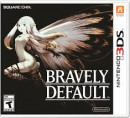The_Liquid_Laser said:
LMU Uncle Alfred said:
How do the chapters in OT work? If you're doing someone else's path, you can just go to another's path and that previous character will level up? How about the rest of the characters?
Excessive grinding can be a tiring process and be a roadblock for more gamers than not. Or at the very least it can wear some down to the point they just stop playing the game after realizing how much more grinding they'd have to do.
|
JRPGs didn't become super popular until Final Fantasy 7. However there was a very passionate group of niche gamers that really loved the NES/SNES/Genesis era of RPG. Games like Bravely Default and Octopath Traveler are really for that passionate niche, or for younger people who would have been in that niche if they were given the chance. These games are definitely not for everyone, but many of the people who play them like the grind as long as the combat system is good and the monsters are well designed and so on. I remember the first time I played Final Fantasy Tactics I would grind all the time and I just really had a blast.
|
Passionate is the politically correct word on that front >.>
FF tactics is a different beast though as a SRPG. Every battle felt like you were constantly getting stronger and gaining points you could use soon, and it had an emphasis on distance between characters. You could also prolong the battles to make more gains without having to end it and then start another one; thus every action netted you rewards and not just ending battles. If JRPGS on the 16 bit era would just take into account a better balance of number of battles to get into , with more to gain per battle they would have a better reputation on the mainstream front. Maybe do a design more like Chrono Trigger too instead of an omnipresent encounter rate. I don't know if it's coincidence or not, but it's like there's this dogma that for 16 bit era RPGs you can't have a relaxing encounter rate, or if not that you can't be allowed to progress relatively quickly. I found out that for FF7 the JP version has a higher encounter rate than the US version. Whoever made that decision for the US version may have well made the best decision ever for the FF franchise considering how important FF7 was to introducing RPGS to people, not just JRPGs.

















































